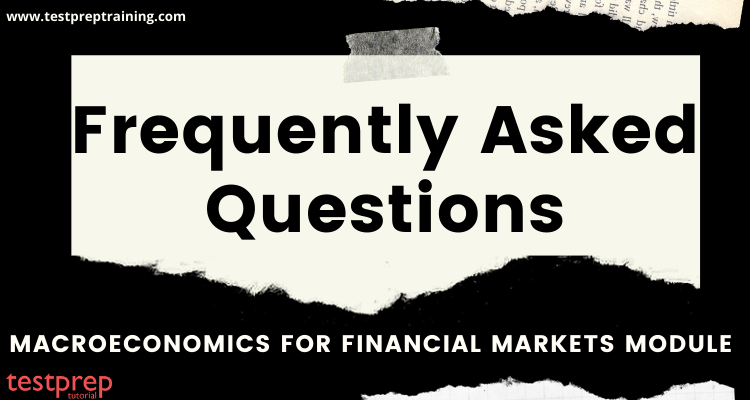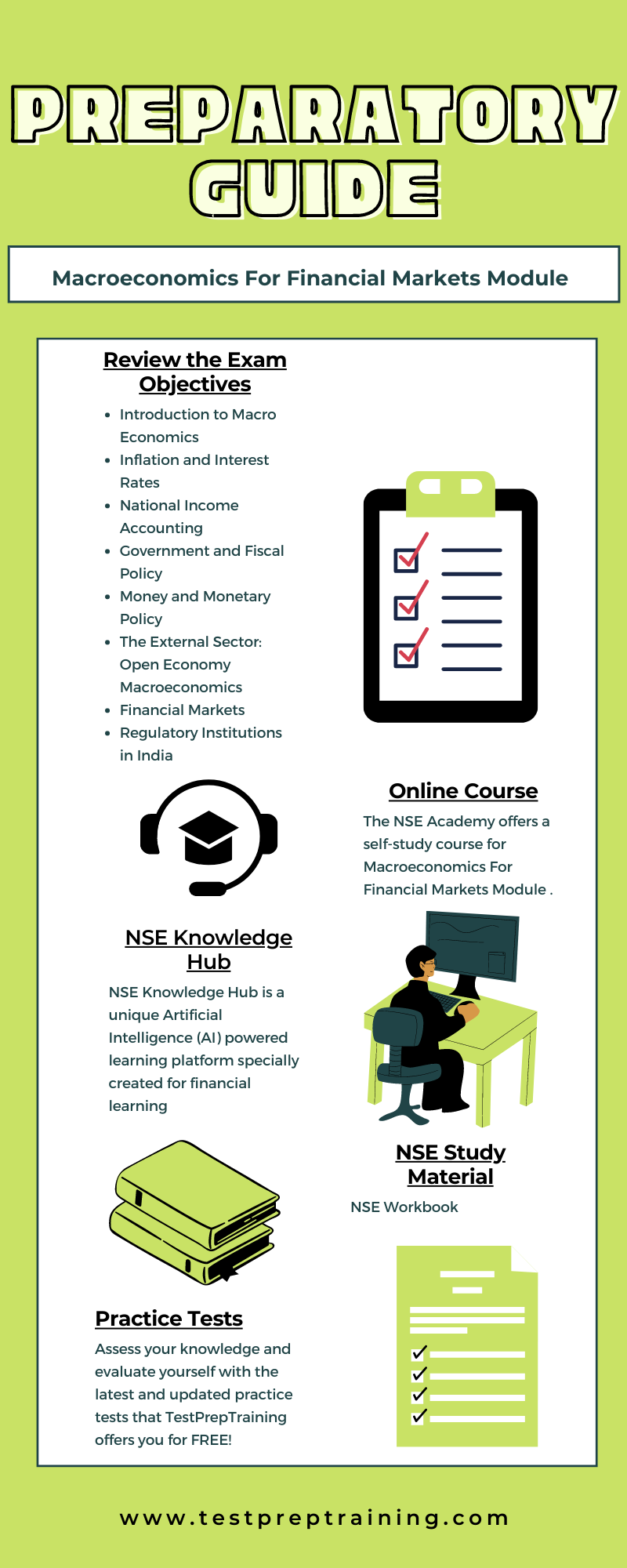Macroeconomics For Financial Markets Module

Understanding economics is essential for figuring how financial markets work. There are complex interconnections between numerous economic conditions and financial variables that can have direct and indirect effects on financial markets. An economic viewpoint aids in identifying the reasons of various economic trends as well as anticipating the potential impact of policy changes.
This Macroeconomics For Financial Markets Certification Examination aims at providing a basic understanding of various macroeconomic concepts and a glimpse of macroeconomic behavior.
Target Audience
The Macroeconomics For Financial Markets Module (Intermediate) exam is targeted towards the following mentioned audience:
- Firstly, Students of Management and Commerce
- Secondly, Economists
- Thirdly, Finance Professionals
- Fourthly, Stock Analysts
- Also, Employees with financial institutions
- Lastly, Anybody having an interest in this subject
Macroeconomics for Financial Markets Module Interview Questions
Macroeconomics For Financial Markets Exam Details
- Familiarising with the exam details is important before commencing on with your preparations.
- The Macroeconomics For Financial Markets Module exam covers 60 questions.
- You get 120 minutes to complete all these multiple choice questions.
- Also, the passing score s 60%. Moreover, the Macroeconomics For Financial Markets Module Exam Questions are available in English Language only.
| Exam Name | Macroeconomics For Financial Markets Module |
| Exam Vendor | NSE – National Stock Exchange of India Ltd. |
| Exam Level | Intermediate |
| Certification Validity | 5 Years |
| Exam Language | English |
| Exam Format | Multiple Choice Questions |
| Exam Duration | 120 minutes |
| Number of Questions | 60 |
| Passing Score | 60% |
| Negative Marking | Yes |
Exam Registration
- Candidates can register online by going to Education>Certifications>Online Register / Enroll and clicking on the ‘Online Registration‘ link.
- You will be given a unique NCFM registration number, as well as a user id and password, once you have completed the registration process.
- After that, confirmation will be sent to the email address and phone number provided during the registration process.
- Finally, you may use the same to log into your online NCFM account and make payments, enroll for tests, amend your address, check the status of your study materials, and see certifications, among other things.
Frequently Asked Questions
CLICK HERE to move to the Frequently Asked Questions section.

Macroeconomics For Financial Markets Module Course Outline
Macroeconomics For Financial Markets Module Exam course covers the following domains:
1. Introduction to Macro Economics
- Introduction
- Microeconomics and Macroeconomics
- Why Macroeconomics is important for the financial sector
- The concept of ‘equilibrium’ in economics
- Broad outline
2. Inflation and Interest Rates
- What is inflation?
- How to measure inflation?
- Theories of inflation
- Impact of inflation on macroeconomic variables
- Controlling inflation
- Interest Rates
- Factors affecting the level of Interest Rate
- Impact of Interest Rates
- Concept of Real Interest Rate
3. National Income Accounting
- National Income Accounting: Measuring Economic Activity
- Some other ways to measure National Income
- Saving and Investment in India
- The changing composition of India’s economic environment
4. Government and Fiscal Policy
- Role of the Government in an Economy
- Government Expenditure and Revenue: Understanding the Government accounts
- Bringing together the Revenue and the Expenditure side
- The Deficit Indicators
- Financing of deficit by the Government
- Fiscal Deficit and sustainability of Internal Debt
- Fiscal policies and their impact on the financial markets
5. Money and Monetary Policy
- What is the role of Money?
- Components of Money in India
- Demand for Money
- Supply of Money
- Different roles of RBI in India
- Role of Commercial Banks in Money Supply
- Other Instruments of Money Supply
- Market Stabilization Scheme
- Use of Monetary policy
- Use of Fiscal policy
6. The External Sector: Open Economy Macroeconomics
- Why do countries trade?
- India and International Trade
- Balance of Payments
- Foreign Direct Investment
- Foreign Portfolio Investment
- Exchange Rates
- Foreign Exchange Reserves
- Impact of capital flows on money supply
- Sterilization of Capital Flows
7. Financial Markets
- Basic roles of the financial market
- Why and how are financial markets different from other markets?
- Role of different financial systems: Bank based financial systems and
Capital Market based financial systems - Role and contribution of different segments in India’s Financial Market
- The Equity Market
- Derivatives Market in India
- The Debt Market
8. Regulatory Institutions in India
- Role of regulatory institutions in a market-based economy
- The Reserve Bank of India (RBI)
- The Securities and Exchange Board of India (SEBI)
- Insurance Regulatory and Development Authority (IRDA)
- Pension Fund Regulatory and Development Authority (PFRDA)
- Forward Markets Commission (FMC)
- Stock Exchanges in India
Preparatory Guide – Macroeconomics For Financial Markets
Before you get started, you must refer to the following preparatory guide that mentions all the relevant and possible learning resources that are ideally required for the exam preparation.

1. Refer to Exam Objectives
For Macroeconomics For Financial Markets Module, NCFM provides the course outline. This course outline includes topics categorized into various sections and subsections, thus, helping candidates to start their preparation in a sequential way. For the test, the course outline includes:
- Firstly, Introduction to Macro Economics
- Secondly, Inflation and Interest Rates
- Thirdly, National Income Accounting
- Fourthly, Government and Fiscal Policy
- Also, Money and Monetary Policy
- Moreover, The External Sector: Open Economy Macroeconomics
- Furthermore, Financial Markets
- Lastly, Regulatory Institutions in India
2. Online Course
Macroeconomics For Financial Markets Module Training and Online Courses supplement your learning experience. The NSE Academy offers the self-study course for Macroeconomics For Financial Markets Module. Enrolling in here can help you understand all the fundamentals and essential concepts. Furthermore, this will lead to help you prepare for the test.
3. NSE Knowledge Hub
NSE Knowledge Hub is an AI-First and Mobile-First ecosystem of personalized and community-based learning. This is a one-of-a-kind Artificial Intelligence (AI)-powered learning platform designed specifically for financial learning and to help the BFSI sector improve employee skills while also assisting academic institutions in developing future-ready talent for the financial services industry.
- Firstly, become familiar with banking, insurance, and finance topics, discover content in various domains in finance
- Secondly, formal and informal learning through hours of curated content tailored to the individual’s areas of interests and goals
- Lastly, Up-Skill by enrolling in free or paid deep skilling pathways at a marketplace with well-known providers of courses, assessments, labs, and credentials
4. NSE Study Material
NSE provides a workbook for all certification exams, which may be obtained only when the module has been paid for. By entering into your account and selecting the E-Library option, you can quickly download this. NSE does, however, provide applicants with the option of purchasing Workbooks for NCFM modules by submitting a request letter. This must be accompanied by a demand draught in the amount of Rs. 500/- per module for each workbook.
5. Practice Tests
Self-evaluation provides you with greater insight into your preparation. Before the actual certification test, indeed, it is highly recommended to give Macroeconomics For Financial Markets Module Mock Tests. Moreover, it will help you determine your skills and preparation, making you familiar with the exam pattern.
Assess your knowledge and evaluate yourself with the latest and updated Macroeconomics For Financial Markets Module Practice Test that TestPrepTraining offers you for FREE!


